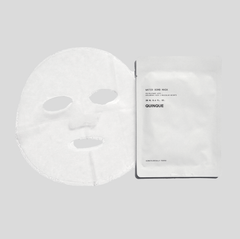What if a good night's sleep was the #1 beautiful skin secret? We are not just talking about dark circles, but about cutaneous chronobiology. Because yes, while you are in the arms of Morpheus, your skin is effervescent. The perfect opportunity to boost your natural regeneration process!
No, your skin never sleeps
Did you know that your skin rotates 24 hours a day ? It is indeed an organ in its own right that performs specific functions, many of which depend on a circadian rhythm. In other words, your skin has its own biological clock and regulates its activity on a 24-hour cycle.
During the day , it protects you against external aggressions. At night , it abandons its role as a shield to regenerate and continue to do its job the next morning. The benefits of sleep on the skin therefore contribute mainly to maintaining its (many) properties.
What happens to your skin at night?
- From 11 p.m. to 4 a.m.: the cutaneous microcirculation is at its maximum rate. The blood flow provides the cells with the nutrients they need to multiply and facilitates the elimination of toxins. It is also he who is behind the fresh and rested complexion of waking up.
- Around 1 a.m.: the production of new cells in the epidermis reaches its peak (with a rate up to 4 times more intense than at 1 p.m. [1] ). This renewal allows the skin to repair itself (pimples, spots, etc.) and maintain a healthy appearance. In short, you have a new look !
The effects of a bad night's sleep on the face
If the benefits of sleep on the skin are proven, a sleep debt does not go unnoticed . Spoiler: it does not stop at the pockets or the gray mine. A study by the British Association of Dermatologists reveals that chronic lack of sleep leads to:
- A favorable ground for accelerated skin aging . On the program: loss of suppleness, sagging skin, wrinkles and fine lines. Whoops !
- Impaired barrier function of the skin . Thus overexposed to dehydration, the skin can end up showing discomfort, irritation and redness. Not great.
How to support your nocturnal skin regeneration?
Your skin is most permeable around 4 a.m. [2] . Result ? Night is the perfect time to apply targeted cosmetic active ingredients . Your skin will always appreciate a boost, especially from the age of 25 (the fateful age when cell renewal slows down).
The gesture to adopt to maximize the benefits of sleep on your skin : a dab of anti-pollution moisturizing cream before bedtime.
Its formula rich in fatty acids, vitamins and CBD stimulates epidermal turnover while strengthening your skin's antioxidant and anti-dehydration defenses. Day and night, it's the ally of city dwellers to fill up with radiance and comfort !
____
[1] F. HENRY (1), JE ARRESE (2), N. CLAESSENS (1), C. PIÉRARD-FRANCHIMONT (3), GE PIÉRARD (4) — THE SKIN AND ITS EVERYDAY CHRONOBIOLOGICAL CLOCK, 2002
[2] Alexis B. Lyons , MD, Lauren Moy , MD, Ronald Moy , MD, and Rebecca Tung , Circadian Rhythm and the skin: A Review of Literautre, 2019
[3] P. Oyetakin-White , A. Suggs , B. Koo , MS Matsui , D. Yarosh , KD Cooper , ED Baron , Does poor sleep quality affect skin quality? , 2014
[4] L. Misery , S. Morisset , S. Séité , E. Brenaut , A.-S. Ficheux , JW Fluhr , V. Delvigne , C. Taieb , Relationship between sensitive skin and sleep disorders, fatigue, dust, sweating, food, tobacco consumption or female hormonal changes: Results from a worldwide survey of 10,743 individuals , 2021
[5] Black D, Del Pozo A, Lagarde JM, Gall Y.— Seasonal variability in the biophysical properties of stratum corneum from different anatomical sites. Skin Res Technol, 2000, 6, 70-76.
[6] Patrick T. Thorburn Renata L. Riha , Skin disorders and sleep in adults: Where is the evidence?, 2009
[7] Reinberg A.— Cutaneous chronobiology, important to recognize and respect. Cosmetology, 2000, 26, 32-34.
[8] Reinberg A, Reinberg MA.— Circadian changes in local anesthetic agents








